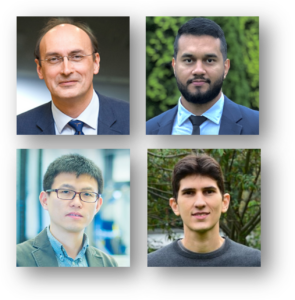[S/YP webinar] New and emerging applications of dual-active bridge (DAB) converters
Monday 5 February 2024 at 2:00 PM CET, 8:00 AM EST
By Rik W. De Doncker, Edivan L. Carvalho, Tao Yang and Levy Costa
Joint Webinar with IEEE IES Students and Young Professionals Activity Committee (S&YP)
 Register now using the link below:
Register now using the link below:
https://attendee.gotowebinar.com/register/5705655443767865440
Abstract:
From highly efficient buildings to more electric aircraft, the dual active bridge (DAB) converter has been seen as the main enabling technology for the electrification of modern applications. Additionally, recent, and developing standards, opened the possibility of making research for such applications more focused and oriented to industrial development. Thinking in application-oriented designs allows us to push the DAB technology boundaries for more efficient solutions that are reliable, cost-effective, and ready for these new challenges. Our upcoming webinar dives deep into the application-specific requirements and the latest developments of DAB. Join us to explore its role in highly efficient DC buildings, the electrification of more electric aircraft (MEA), and the integration with solid-state transformers (SSTs).
Presenters’ bio:
Rik De Doncker (Life Fellow, IEEE) received the Ph.D. degree in electrical engineering from KU Leuven, Leuven, Belgium, in 1986, and the doctor honoris causa degree from TU Riga, Riga, Latvia, in 2011. In 1987, he was appointed as a Visiting Associate Professor with the University of Wisconsin–Madison, Madison, WI, USA, where he developed the DAB converter. In 1988, he joined the GE Corporate Research and Development Center, Schenectady, NY, USA. In November 1994, he joined Silicon Power Corporation (formerly GE-SPCO), Devault, PA, USA, as a Vice President of Technology, developing the world’s first medium-voltage static transfer switch. Since October 1996, he has been a Professor with RWTH Aachen University, Aachen, Germany, where he leads the Institute for Power Electronics and Electrical Drives (ISEA). In October 2006, he was appointed the Director of the E.ON Energy Research Center, RWTH Aachen University, where he is the Director of the BMBF Flexible Electrical Networks (FEN) Research CAMPUS. He has published more than 700 technical papers and is a holder of more than 60 patents. Dr. De Doncker became a member of the German Academy of Science and Technology (ACATECH) in 2016. He was a recipient of the IAS Outstanding Achievements Award, the IEEE Power Engineering Nari Hingorani Custom Power Award in 2008, the 2013 Newell Power Electronics IEEE Technical Field Award, and the 2014 IEEE PELS Harry A. Owen Outstanding Service Award. In 2015, he was awarded Fellow Status at RWTH University. In 2020, he received the IEEE Medal in Power Engineering.
Edivan Laercio Carvalho received the B.Sc. and M.Sc. degrees in electrical engineering from the Federal University of Technology-Paraná (Paraná, Brazil) in 2015, and 2018, respectively, and the Ph.D. degree in electrical engineering from Federal University of Santa Maria (Santa Maria, Brazil), in 2021. He spent a year as Power Electronics R&D Engineer with WEG Drives and Controls, where he worked with hardware development for utility scale PV converters, in 2021. Since 2022, he has been with Power Electronics Group of Tallinn University of Technology, Estonia, where he is currently working as a researcher with power converters solution for dc buildings, and applications. He is also vice-chair of the IEEE Estonia Young Professionals Affinity Group.
Tao Yang (SM’20) received his MEng Degree from Shanghai Jiao Tong University, China in 2008 and his Ph.D. degree in electrical engineering from the University of Nottingham, UK in 2013. Since 2013, he has been a Researcher with Power Electronics, Machines and Control Group, University of Nottingham, where he became an Assistant Professor in 2016, and an Associate Professor in 2019. His research interests include high-speed electric motor drive control, power electronic conversion, electrical system design and optimization for more electric/hybrid/all-electric aircraft applications. His PhD research within EU Clean Sky on “Modelling electrical power system for more-electric aircraft applications” has resulted in him winning the inaugural “Clean Sky Best PhD Award” in 2016. Dr. Yang has received multiple paper awards in TIE, TIA and TTE. Dr. Yang is an IET Fellow, Industrial Fellow of Royal Academy of Engineering, Fellow of Higher Education Academy, Associate Editor of IEEE Transactions on Transportation Electrification and Chinese Journal of Aeronautics. Dr. Yang is the Chair of IEEE PELS Technical Committee on Aerospace Power.
Levy Costa received the B.Sc. degree in electrical engineering from the Federal University of Ceara, (Fortaleza, Brazil) in 2010, the M.Sc. degree from the Federal University of Santa Catarina, (Florianopolis, Brazil) in 2013, and PhD degree in electrical engineering from the Christian-Albrecht-University of Kiel (Kiel, Germany) in 2019. From 2013 to 2014, he was a Power Electronics R&D Engineer with Schneider Electric, where he worked with uninterruptible power supply systems (UPS). During this period, he was also an assistant lecturer (part-time) at Federal University of Ceara (Brazil). From 2014 to 2018, he was a Research Assistant with the Chair of Power Electronics, Christian-Albrechts University of Kiel (Kiel, Germany). In 2018, he joins the ABB Corporate Research Center in Switzerland as an R&D Scientist working in emerging technologies, such as fast charging station, solid-state transformer, etc. Currently, Levy Costa is Assistant Professor at Eindhoven University of Technology (TU/e).

